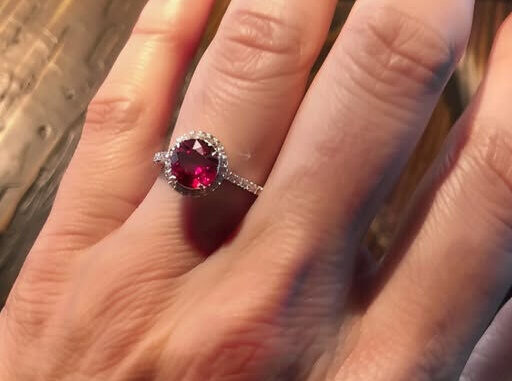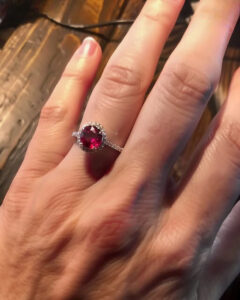
I got engaged last fall to Daniel, the love of my life. He proposed with a vintage ring that had belonged to his grandmother—three generations old, delicate, stunning.
A week later, his mom, Linda, invited me to coffee. She leaned in, patted my hand, and said, “Now that you’ve had your moment, give the ring back.”
I froze. “Excuse me?”
She nodded. “The ring. It’s a family heirloom. You can wear it for engagement photos, fine, but afterward… You’ll return it.”
“Daniel gave it to me,” I said. “He told me it’s mine.”
“That’s adorable,” she chuckled. “But it belongs to our family. I just don’t want anything to happen to it. You know, a girl like you… if you needed money. God forbid.”
There it was. Needed money. She knew I worked in nonprofit, and apparently thought I’d pawn it the first chance I got.
I went home and cried. Daniel was livid and offered to step in, but I told him, “No—let me handle this. I’ve got an idea.”
A week later, during our engagement dinner, I stood up mid-meal to toast the family. I thanked everyone, then turned to Linda and smiled.
“And a special thanks to my future mother-in-law,” I said, “who reminded me how important family history is. It inspired me to bring something of my own to the table.”
Then I pulled out a small box… and handed it to her.
Inside was a simple brooch—silver with tiny turquoise stones. “This belonged to my great-aunt,” I said. “She marched with the suffragettes. She taught girls to read when they weren’t allowed to go to school. She wore this brooch every day until she passed. It’s not worth much money, but it means the world to me.”
Linda opened her mouth, but I kept going.
“I wanted you to have it. You see, I believe family heirlooms should be passed down to those we trust—to those who’ll honor them. So thank you for reminding me to protect the things that matter most.”
The room was dead silent. You could hear someone putting down their fork three tables away. Linda blinked. Once. Twice. Then offered a tight-lipped smile and muttered, “How thoughtful.”
I knew then—we were never going to be best friends.
Over the next few weeks, Linda kept her distance. Not overtly rude, but colder than usual. She skipped the dress shopping trip and didn’t reply in the group chat when we sent venue options. Daniel noticed, but I told him not to push her. I figured she needed space.
And then, a twist.
Two months before the wedding, Linda called Daniel in tears. His younger brother, Caleb, had been caught stealing money from their dad’s small business. He had a gambling problem—hidden pretty well until it wasn’t. Linda was devastated. It wasn’t just the theft; it was the shame, the fear. She asked Daniel to come over and help “talk some sense into him.”
When Daniel told me, I didn’t hesitate. “Let’s go,” I said.
That night was hard. Caleb was a wreck—ashamed, angry, and scared. Linda, to her credit, wasn’t cruel, just deeply hurt. I kept mostly quiet until Daniel excused himself to call their dad.
That’s when Linda turned to me, finally meeting my eyes for the first time in weeks.
“I owe you an apology,” she said quietly. “I was wrong about you. Completely wrong.”
I didn’t say anything right away. Just nodded, letting her sit with it.
She continued. “You’re calm in chaos. You don’t run. I thought you were after the ring or… I don’t know. Some silly fear I made up in my head. But you came here tonight when you didn’t have to. And I saw the way Caleb looked at you—like you were safe.”
That broke me a little. I didn’t want her approval anymore, not really, but I did want her to see me. Not as “a girl like me,” but as someone who could love and protect her son—and maybe even her.
“Thanks for saying that,” I told her. “I know we got off to a weird start. But I never wanted to take anything from you. Just build something with your son.”
She nodded, wiping her eyes. “And I want that too. I do.”
The moment wasn’t perfect, but it was real. That was enough.
We got married in the spring under a huge oak tree in my aunt’s backyard, surrounded by wildflowers and people who loved us. Daniel cried the whole way through his vows—ugly cried, like his whole heart came pouring out his eyes. I didn’t do much better.
Linda sat front row. She wore the brooch.
After the ceremony, as we hugged guests and posed for photos, she pulled me aside.
“Hey,” she said. “Keep the ring.”
I blinked. “What?”
“The engagement ring. It’s yours. Forever. No conditions.”
I smiled, a little stunned. “Are you sure?”
She nodded. “I finally realized—it’s not the ring that matters. It’s who wears it. And I trust you with it. More than I ever thought I would.”
I hugged her, and this time, she didn’t stiffen. She leaned into it.
A few years later, after we had our daughter, I found Linda sitting with her on the porch, showing her the brooch. Telling her stories about the suffragettes. About her own mother. About history, and the weight of memory. My daughter was three and barely understood, but she clutched that brooch like treasure.
And I realized something that day: family isn’t just what you’re born into. It’s what you build, what you choose, what you protect. It’s not about heirlooms or bloodlines or who’s “in” and who’s not. It’s about who shows up. Who stays. Who listens.
Linda and I still don’t agree on everything. She can be opinionated, blunt, a little extra. But now I know she loves fiercely—and so do I. And somehow, that made room for us both.
Life lesson? People are more than their worst assumptions. And trust—real trust—takes time. Sometimes it starts with a brooch. Sometimes it ends with a seat on the porch, passing down stories to the next generation.
If you’ve ever had a rocky start with someone important, don’t give up right away. Sometimes the best relationships are the ones that grow from scratch.
👉 If this story touched you, share it with someone you love—or someone you’re still learning to love. And don’t forget to like it too. Who knows whose heart it might soften today? ❤️
